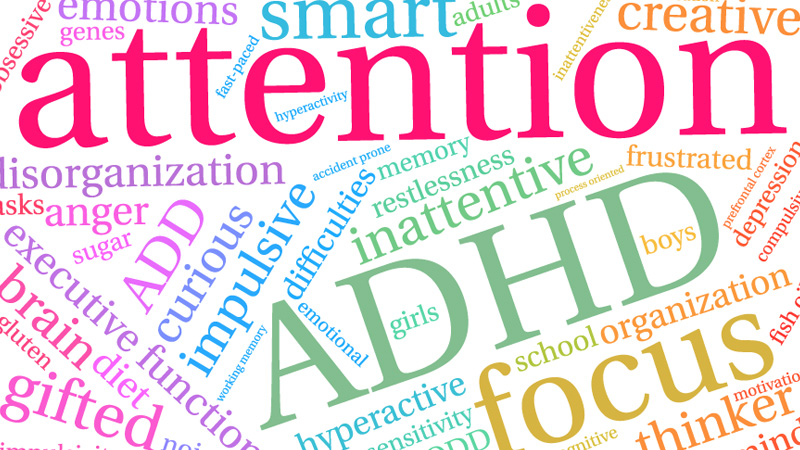Home > Mental Health > ADD / ADHD
ADD / ADHD in Teens
Attention deficit disorder (ADD) is now referred to as attention deficit hyperactivity disorder (ADHD).

General Information
ADHD is a neurological disorder that is characterized by impulsiveness, hyperactivity, and attention difficulties. Attention deficit hyperactivity disorder is extremely common and is said to affect between eight and ten percent of young people in the United States. The diagnosis process for ADHD is rather complicated, as there is no single test for diagnosis, and symptoms will vary from teen to teen. The number of teens that are incorrectly diagnosed and subsequently prescribed medication for ADHD in America is huge. It is highly common for symptoms of anxiety to appear as manifestations of ADHD, when really the proper diagnosis may be an anxiety disorder. The medications that are prescribed for teens that have ADHD versus those who suffer from anxiety disorders are vastly different. Furthermore, the types of medications that are often prescribed for a teen with ADHD can be detrimental to a teenager who has an anxiety disorder that does not require medication. This is why it is essential to have a mental health professional evaluation to obtain the proper diagnosis for your teenager.
Signs and Symptoms of ADHD
The maturation process a young person goes through during his or her adolescence is huge. There are many changes in one’s personality and behaviors as he or she grows and goes through the teenage years. The signs and symptoms that can occur in a young person with ADHD can manifest in a person as young as five years old, though diagnosis is difficult to do in such a young child. Symptoms will often range in severity and can differ depending on one’s gender. Below are examples of some of the common symptoms that can arise in a teenager with ADHD:
- Inattention to detail
- Unable to engage in activities that require prolonged attention
- Failure to meet deadlines (i.e. does not complete homework on time)
- Mind constantly wandering/ does not listen when directly spoken to
- Organizational difficulties
- Misplaces belongings frequently
- Easily distractible
- Excessive talking
- Regularly and mindlessly fidgeting
- Restlessness
- Little or no patience
A young person who is diagnosed with ADHD will exhibit at least five of the symptoms from the above list, lasting for a duration of six months or longer, in multiple settings. The symptoms associated with ADHD that are experienced by the teen will interfere with his or her ability to appropriately function in his or her daily life.

Treatment
There are many types of treatment available for a young person with attention deficit hyperactivity disorder. At Pacific Teen Treatment, we create individualized treatment plans for teens struggling with ADHD, using a blend of different approaches. A common way to treat ADHD is through various therapeutic modalities in addition to medication. Parents are included in the treatment plan, especially when medication may be involved. Additionally, we consult with the most qualified, leading experts in adolescent psychiatry regarding psychoactive medication for our residents.
Some of the therapeutic methods that are used at Pacific Teen Treatment, with teenagers who have ADHD, include talk therapy, cognitive behavioral therapy (CBT), dialectical behavior therapy (DBT), expressive arts therapies, and relaxation techniques. Cognitive behavioral therapy helps a teenager identify and acknowledge his or her unhealthy thought processes which had led to harmful behavioral patterns. Once a young person is able to do this, he or she will then learn to replace the unhealthy thought processes with healthy ones, subsequently resulting in healthier behaviors. DBT is a therapeutic modality that helps to teach a young person mindfulness based skills to gain control over his or her emotions. This allows for healthier relationships and improved interpersonal skills. Expressive arts therapies are helpful for a person with ADHD, as through engaging in various art activities, a teen can work through emotional challenges and learn to manage the symptoms that accompany ADHD. Some of the relaxation techniques that are integrated in a teen’s treatment plan with ADHD include meditation, yoga, and exercise.
Further Information
Every family in need of mental health treatment must select a program that will best suit the needs of their family. When one member of a family struggles, it impacts everyone in the family unit. In order to maximize the benefits of treatment we work closely with the entire family to ensure that everyone is receiving the support they need through these difficult times.
Seeking help is never easy, but you are not alone! If you or someone you know is in need of mental health treatment, we strongly encourage you to reach out for help as quickly as possible. It is not uncommon for many mental health difficulties to impact a person’s life, long term. Seeking support at the beginning of one’s journey can put the individual in the best position to learn how to manage themselves in a healthy way so they can go on to live happy and fulfilling lives.
Our admissions team can be reached 24/7 at info@pacificrtc.com or call: Phone Number,(800) 531-5769
We are available to answer any questions you may have regarding mental health treatment and our residential program, anytime. Contact us today using the form to the right.

